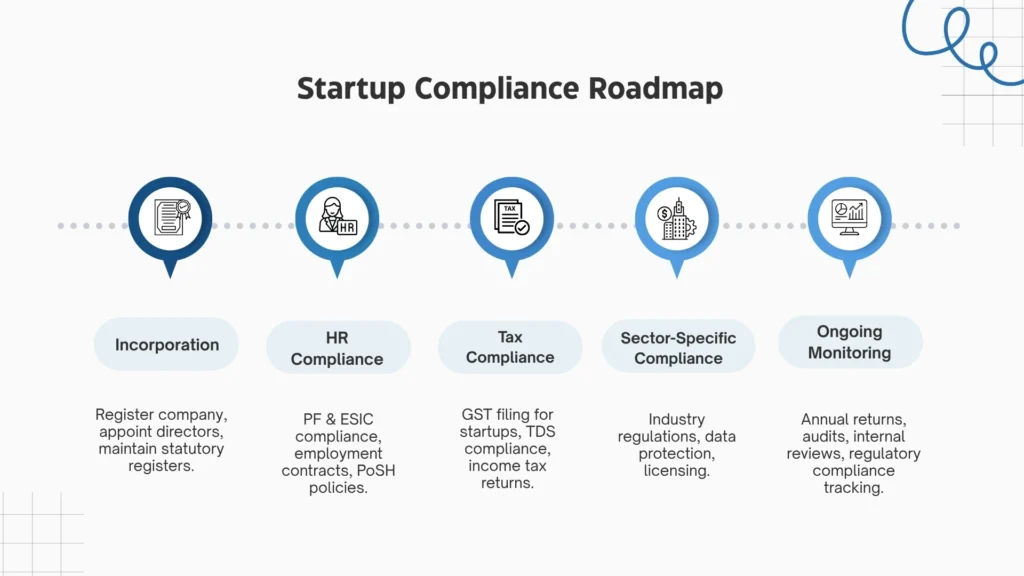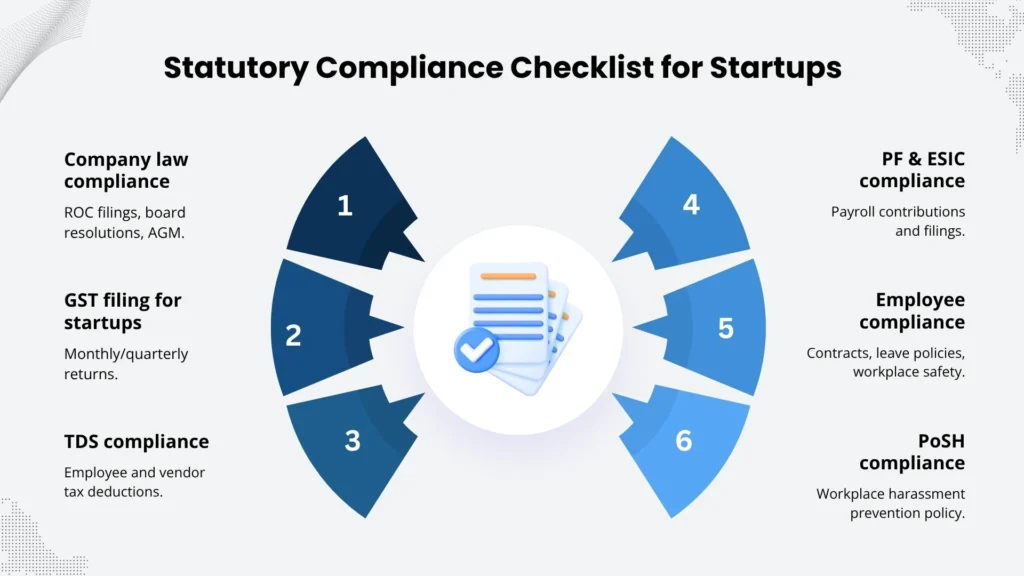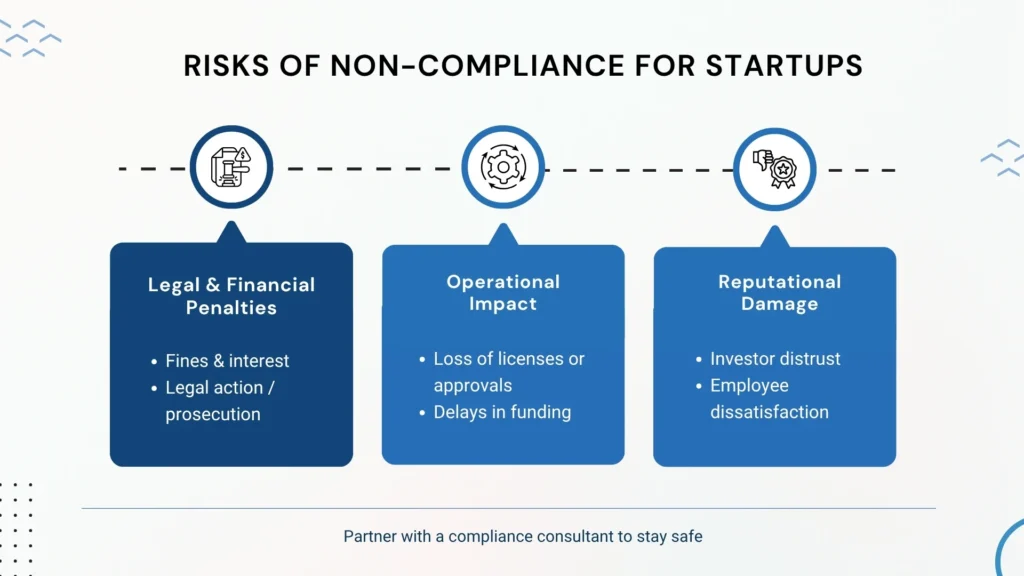Starting a business is exciting, but staying compliant with laws and regulations often feels overwhelming for new founders. Statutory compliance is the mandatory rules and regulations that all the companies are obliged to observe. In the case of startups, establishing compliance mechanisms at the earliest stages will not only prevent fines, but it will also make the startups credible to investors, employees, and customers. This guide can make statutory compliance simple as a beginner and even clarifies what you need to know and where your startup is likely to lack.
Why Statutory Compliance Matters for Startups
Every startup, regardless of its size, must meet certain startup legal compliance requirements. These obligations cover labour laws, tax filings, corporate governance, and safety regulations. Non-compliance can result in heavy fines, legal action, or even loss of licenses. More importantly, investors and partners prefer businesses that demonstrate accountability and structured regulatory compliance.
By understanding the basics of company law compliance, founders can save time, reduce risks, and focus on scaling their business without fear of unexpected legal roadblocks.
Core Areas of Compliance for Startups

1. Incorporation and Corporate Governance
From day one, startups must ensure proper registration and filings. Corporate governance goes beyond just setting up a board, it means maintaining statutory registers, conducting board meetings, and filing forms with the Registrar of Companies. Common obligations include:
- Filing annual returns and financial statements.
- Holding Annual General Meetings (AGMs).
- Keeping up-to-date records of directors and shareholders.
Strong governance systems build investor confidence and protect founders from personal liability.
2. HR and Labour Law Compliance
One of the most overlooked areas is HR statutory compliance. Hiring employees means complying with labour laws, maintaining proper contracts, and ensuring workplace safety standards. Key areas include:
- PF & ESIC compliance for employee benefits and health coverage.
- Minimum wages and overtime rules.
- Shops and Establishment Act registration.
- PoSH compliance to prevent workplace harassment.
Partnering with a PF & ESIC Consultant can help startups manage payroll-related compliance without errors. Many companies also prefer working with a PAN India compliance agency that offers end-to-end compliance services for multi-location operations.
3. Taxation and Financial Compliance
Taxes are central to statutory compliance. Startups must stay on top of direct and indirect taxes, including:
- GST filing for startups to comply with indirect taxation.
- TDS compliance for deducting and remitting tax at source.
- Income tax filings and audit requirements.
- Maintaining proper invoices and books of accounts.
Accurate tax compliance not only avoids penalties but also improves transparency for funding rounds. Many founders engage a compliance consultant or rely on legal compliance services to ensure they meet all deadlines.
4. Employee and ESOP Compliance
Startups thrive on talent, and ensuring employee compliance builds trust. This includes issuing appointment letters, maintaining payslips, adhering to leave rules, and providing social security benefits.
Another area often ignored is ESOP (Employee Stock Ownership Plan) compliance. Issuing equity to employees comes with taxation obligations and reporting requirements under company law. By integrating ESOP rules into their compliance calendar, startups can avoid legal complications later.
5. Sector-Specific and Regulatory Compliance
For certain industries such as fintech, healthcare, or edtech, additional regulatory compliance frameworks apply. Fintech startups may need RBI approvals, while healthcare companies must comply with licensing and data protection laws. Founders must identify industry-specific rules early to avoid delays in operations or funding.

Topics Startups Often Miss in Compliance
Most beginners focus only on taxes and company incorporation, but statutory obligations run much deeper. Here are commonly missed areas that every founder should know:
- Compliance calendar for startups – A month-by-month schedule of filings, renewals, and deadlines to avoid last-minute rush.
- PoSH compliance – Mandatory prevention of sexual harassment policy and training sessions for employees.
- Contractor vs employee classification – Misclassification of gig workers can lead to labour disputes and penalties.
- State-wise labour law compliance – Rules for working hours, leaves, and safety differ across states, which startups often overlook.
- IPR and data protection compliance – Protecting intellectual property and ensuring data security are crucial, especially for tech startups.
- Penalties for non-compliance – Awareness about fines and prosecution risks encourages startups to stay vigilant.
- Board meeting compliance checklist – Maintaining minutes, resolutions, and records in the prescribed format is mandatory.
By addressing these missed areas, startups not only stay legally safe but also strengthen their reputation.

The Role of Compliance Consultants and Agencies
Many startups lack the internal bandwidth to manage complex compliance frameworks. This is where engaging a compliance consultant or legal compliance services provider makes sense. A PAN India compliance agency ensures that startups operating across multiple states remain consistent with regional rules. Similarly, compliance services providers integrate tax, HR, and labour law obligations into one platform, making it easier for founders to track obligations.
Leveraging Compliance Automation Tools
Technology has simplified how compliance is managed. Compliance automation tools can help startups:
- Track filing deadlines.
- Generate automated reminders for statutory obligations.
- Maintain digital records of invoices, employee documents, and board minutes.
- Integrate with payroll and accounting systems.
By adopting automation early, startups save time and reduce the risk of manual errors in PF & ESIC compliance, TDS compliance, and GST filing for startups.
Building a Compliance-First Culture
Compliance isn’t just a checklist, it’s a culture that startups need to embed from the beginning. This includes:
- Regular compliance training for employees.
- Setting up clear policies such as code of conduct, whistleblower, and workplace safety.
- Encouraging founders and managers to understand company law compliance and employee compliance obligations.
- Monitoring adherence through internal audits and self-assessments.
Creating this culture ensures that statutory rules become part of daily operations rather than an afterthought.
Practical Steps for Beginners
- Start with a compliance calendar – Track all filings (ROC, GST, TDS, PF, ESIC) month by month.
- Engage experts – Work with a PF & ESIC Consultant or a trusted compliance consultant for complex filings.
- Use automation – Implement compliance automation tools to reduce manual errors.
- Maintain transparency – Keep accurate financial statements and HR records for audits.
- Review annually – Conduct internal reviews to ensure no gaps in HR statutory compliance, tax obligations, or industry regulations.
FAQ’s
It helps startups avoid penalties, maintain corporate governance, and build credibility with investors, employees, and regulators.
Mandatory compliances include GST filing for startups, TDS compliance, annual returns, labour laws under PF & ESIC, and employee compliance requirements.
Startups should maintain employment contracts, provide mandatory benefits, follow wage laws, and implement workplace policies with the help of HR statutory compliance experts.
Non-compliance can lead to fines, legal action, loss of licenses, or reputational damage that impacts funding and partnerships.
Yes, adopting legal compliance services early helps startups align with tax, labour, and corporate rules from incorporation, avoiding costly mistakes later.
By embedding regulatory compliance into daily processes, training employees, using automation, and working with professional agencies, startups can create a culture of accountability.

















